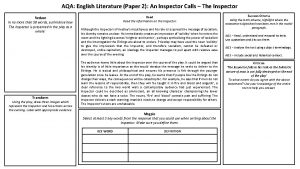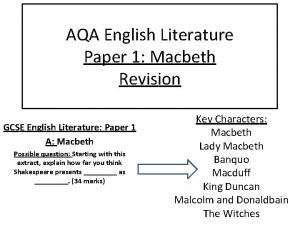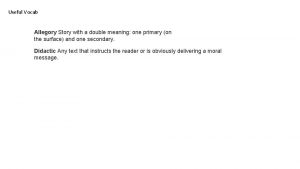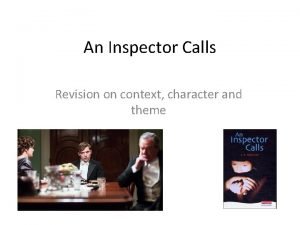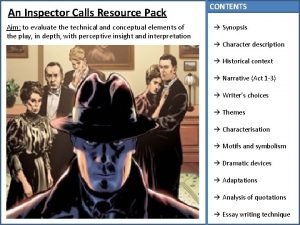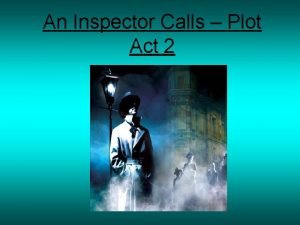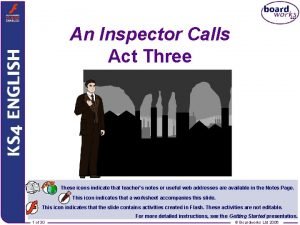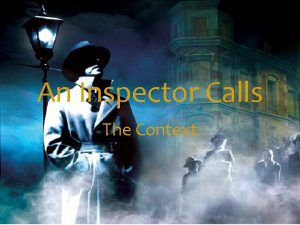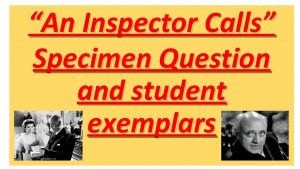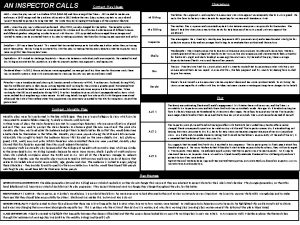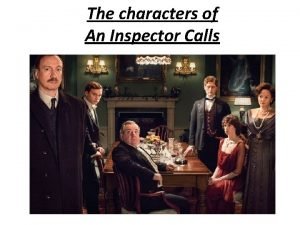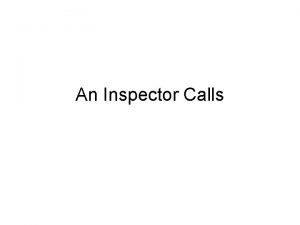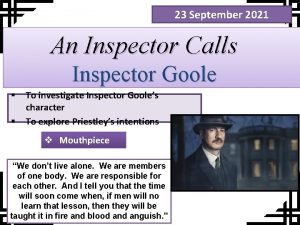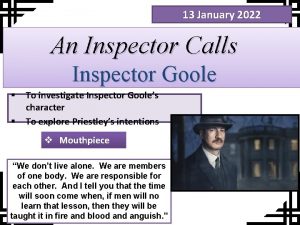Kelso High School English Department An Inspector Calls





























- Slides: 29

Kelso High School English Department

‘An Inspector Calls’

Learning Intentions – Act One § Plot / Key incidents ¡ Setting ¡ Characterisation – The Birling Family / Arthur Birling / Sybil Birling / / Sheila Birling / Eric Birling / Gerald Croft / Eva Smith (Daisy Renton) / Inspector Goole ¡ Dramatic Techniques: Tension / Entrances / Exits / Dramatic Irony ¡ Structure: Opening ¡ Stagecraft: One set / Lighting ¡ Themes : Social Class / Social Responsibility / Remorse and Guilt / Reality versus Illusion

Summarising Act one ¡Bullet point the main points of the plot of Act 1. ¡Write three bullet points for each of the following characters explaining what you learn about them: Arthur, Sybil, Sheila, Eric, Gerald ¡From what you’ve read, explain what you think the main themes are and back up your answers with reference to the play. ¡What do we know about the character of Inspector Goole and what he’s like at this point?

Characterisation: Arthur Birling

Characterisation: Arthur Birling – Act One ¡Portrayed as a successful and ambitious businessman. ¡Treats his daughter’s marriage as a business deal ¡Considers himself to be successful, “a practical man of business”. ¡He is positive about the future, “I say there isn’t a chance of war”. This shows how shortsighted he is.

Characterisation: Arthur Birling – Act One ¡He likes to be respected. He is well known in Brumley and likes to tell people he used to be the Lord Mayor, ¡He desperately wants Gerald’s family to like him. ¡He is used to being in charge. ¡He does not care about other people. He doesn’t believe in “community and all that nonsense”. He sees working class people as “cheap labour”. ¡He would rather forget about Eva and protect his reputation than face up to what he had done,

Characterisation: Sybil Birling

Characterisation: Sybil Birling ¡She is very traditional and stuck in her ways about her social class. ¡She is unfeeling ¡She thinks that social position is very important ¡She is Arthur Birling’s “social superior”.

Characterisation: Sheila Birling

Characterisation: Sheila Birling § Portrayed as child-like and selfish § Her initial treatment of Eva / Daisy could be because she is immature. § Selfish as she used her social position to get Eva / Daisy fired from the shop. § She does appear to have morals: “But these girls aren’t cheap labour – they’re people”.

Characterisation: Eric Birling

Characterisation: Eric Birling ¡When Gerald jokes that the Inspector might be calling because “Eric’s been up to something”, Eric acts suspiciously. ¡This suggests that he is feeling guilty about something, even though we don’t know what he has done until much later. ¡Uses Eric’s strange behaviour to hint that he is hiding secrets that will damage the Birling family’s reputation.

Characterisation: Gerald Croft

Characterisation: Gerald Croft ¡He is portrayed as respectable ¡He is portrayed as upper class. ¡He is socially superior to the Birlings. ¡He is a younger version of Arthur Birling: ¡ He agrees with Mr Birling about politics, women and laughs at his jokes. ¡He is also a liar as he had an affair with Eva Smith, but told Sheila he was just busy with work.

Characterisation: Eva Smith

Characterisation: Eva Smith ¡Silent character ¡She represents all ordinary, working class women who need help. ¡The Birlings take away her earnings: Sacked for speaking out. Sacked out of jealousy.

Characterisation: Inspector Goole ¡He is in charge § He is not bothered about impressing the Birlings so is not worried about how he treats them. § He is a strong character § He is responsible for making the audience feel sorry for Eva. He takes her side. § He controls the play’s actions dealing with one character at a time

Dramatic Techniques - Tension ¡The Inspector increases the tension by only releasing information bit by bit ¡Act One ends with the Inspector asking, “Well? ” which suggests that he knows Gerald has something to confess.

Dramatic Techniques – Exits ¡When the characters exit they are usually escaping someone or something – e. g. Sheila runs off the stage when she realises that getting Eva / Daisy sacked might have led to her suicide ¡Or it’s used to get more information. Inspector leaves Sheila and Gerald so they can talk about what happened.

Dramatic Techniques – Dramatic Irony ¡When the audience know something that the characters on stage don’t. ¡Birling thinks the future is bright: 1. He says the problems between workers and bosses aren’t serious, BUT there was a General Strike in 1926. 2. He says that the Titanic is “unsinkable”, BUT it sank on its first journey. 3. He says that there definitely won’t be a war with Germany, BUT World War One was about to start.

¡PRIESTLEY USES DRAMATIC IRONY TO MAKE THE AUDIENCE THINK THAT ARTHUR MIGHT BE WRONG ABOUT LOTS OF OTHER THINGS.

Structure - Opening Exposition – introduces us to: 1. Characters 2. Background 3. Themes

Structure: Opening ¡Idea that even before the Inspector arrives it is clear that there are problems. ¡ The way Sheila speaks to Gerald shows she might already have doubts about him. ¡It hints Eric has a drinking problem.

Stagecraft - Set ¡The set is cramped (one room) which increases the tension and makes the whole atmosphere of the play seem more intense.

Theme: Social Class ¡Birling is a rich businessman, but the Crofts are socially “superior” because they inherited land money. ¡Eva Smith lost both her jobs because she was abused by more powerful people. They felt more important than Eva because of their social class. ¡Priestley thinks the class system is unfair for working class people – Eva Smith could represent any working class member of society.

Theme: Social Responsibility ¡Arthur Birling believes that looking after himself and his family is all that matters. ¡He wants to pay his workers as little as possible. He doesn’t care about them – he just wants to make more money. ¡He refuses to take responsibility for the impact he had on Eva’s life. ¡Shelia realises that getting Eva sacked wasn’t very responsible, but she didn’t do anything about it at the time.

Theme: Guilt ¡Sheila begins to feel bad about what she did when she realises the effect it had. ¡Sybil and Arthur stand by what they did and don’t feel guilt as they think they’re superior

Theme Guilt Social class Social responsibility
 English literature paper inspector calls
English literature paper inspector calls English language paper 1 macbeth
English language paper 1 macbeth Gordon watson chemistry
Gordon watson chemistry Gordon watson kelso high school
Gordon watson kelso high school Gordon watson ap chemistry
Gordon watson ap chemistry Kelso high school chemistry
Kelso high school chemistry Kelso high school chemistry
Kelso high school chemistry Double meaning story
Double meaning story Morality in an inspector calls
Morality in an inspector calls An inspector calls characterization
An inspector calls characterization Miners strike 1912
Miners strike 1912 Fairly easy manners
Fairly easy manners An inspector calls context timeline
An inspector calls context timeline Socialism and capitalism in an inspector calls bbc bitesize
Socialism and capitalism in an inspector calls bbc bitesize An inspector calls summary
An inspector calls summary An inspector calls recall questions
An inspector calls recall questions An inspector calls cliff notes
An inspector calls cliff notes An inspector calls plot
An inspector calls plot Inspector calls wordsearch
Inspector calls wordsearch An inspector calls starter activities
An inspector calls starter activities An inspector calls questions
An inspector calls questions Kahoot an inspector calls
Kahoot an inspector calls Rose tinted glasses an inspector calls
Rose tinted glasses an inspector calls Generation gap in an inspector calls
Generation gap in an inspector calls Context of an inspector calls
Context of an inspector calls An inspector calls act 1 questions
An inspector calls act 1 questions Arthur birling
Arthur birling Tension graph an inspector calls
Tension graph an inspector calls Selfishness in an inspector calls bbc bitesize
Selfishness in an inspector calls bbc bitesize English language paper 2 edexcel
English language paper 2 edexcel
